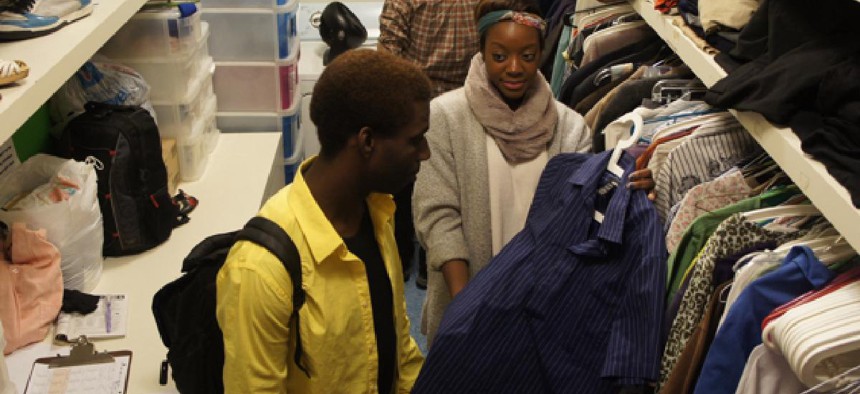Helping LGBTQ teens stay off the streets

Hetrick-Martin Institute
By the time a homeless young person who identifies as lesbian, gay, bisexual, transgender or questioning arrives at the Hetrick-Martin Institute, it is often too late to mend their frayed family bonds, according to staff members at the 37-year-old social services organization. They usually come as teenagers after they’ve been kicked out of their family home due to the cultural stigma attached to being gay, or after they’ve run away.
Part of the problem is that parents often don’t understand the challenges their child is facing as an LGBTQ person, HMI staff said. That’s why, with funding from The New York Community Trust, New York’s community foundation, the organization is launching a pilot program designed to educate parents and families about LGBTQ issues before their children reach puberty.
“We have long felt that there’s too much pressure on a young person during the time that they’re coming out that they can’t shoulder the responsibility of educating their parents at the same time,” said Bridget Hughes, senior director of youth services at HMI.
The curriculum for the program, which will begin with 50 families in the next few months, will include vocabulary and concept skills designed for people who may not be familiar with what it means to identify as LGBTQ. To reach potential participants, Hughes said HMI will leverage its experience and relationships with underserved communities and reach out through the city’s Department of Education to communities of color and schools that serve immigrant communities.
“The real lever of change here is going to be access and relationship building to those communities,” Hughes said. If Hetrick-Martin determines the program has had an impact, she said they’ll aim to expand it.
Founded in 1979, HMI was one of the first organizations in the nation to do outreach work with LGBTQ youth. In 1985, the organization founded Harvey Milk High School for at-risk youth. Today, HMI serves young people between 13 and 24 and their families with a budget of nearly $3.9 million, according to the most recent figures published by GuideStar.
This is the third time since 2013 that HMI’s programming to reduce homelessness among LGBTQ teens has received funding from The New York Community Trust. HMI will use part of the $118,000 grant to fund the pilot. The remainder of the grant will be used to strengthen the outreach work HMI has been doing since 2013.
“Not all these kids trust the system,” said Roderick Jenkins, senior program officer for the jobs and workforce development program and the youth development program at The New York Community Trust. Despite that fact, HMI has been able to put “a dent” in the number of homeless teens living in the city, Jenkins said.
“They’ve done very well,” Jenkins said.
The New York Community Trust has been funding Hetrick-Martin since 1996, and during that time has contributed $726,000 for programs, including academic and leadership training as well as anger management training for LGBTQ youth, according to Community Trust spokeswoman Amy Wolf. Many of the grants came from the organization’s Sam Wilner Fund, which was set up specifically to benefit organizations serving the LGBTQ community.
The 2015 New York City Youth Count Report found there were 6,359 “unsheltered youth” under the age of 25 in New York City – not counting youth living in homeless shelters with adult parents – but admits limitations to the accuracy of its count. Studies by government agencies and social services organization suggest LGBTQ youth account for between 13 percent and 36 percent or more of the total homeless youth population.
After receiving a $71,000 grant in 2013 to contact LGBTQ homeless teens, HMI reached 1,000 LGBTQ homeless youth on the street, enrolling 200 in its housing case management program which includes counseling, hot meals and assistance with housing, legal services and health care. The organization also provided 261 youths with laundry services, toiletries, clothing and food, Hughes said. In 2015, Hetrick-Martin received $100,000 from NYCT, reached 3,097 LGBTQ homeless youth on the street, enrolled 207 youth in case management and provided clothing and food services to 358 youth.
Part of the second year of funding also paid for college scholarships to help homeless youth with school expenses, such as college application fees, textbooks, public transportation and food, Hughes said. The ongoing funding has also paid for staff positions, including Eric Peterson, a housing counselor.
Peterson helps youth navigate government agencies to obtain documents such as New York City identification cards and Social Security cards. These can be particularly significant records for genderqueer youth and especially those who are homeless and dealing with the chaotic situation of couchsurfing, sleeping in public places or engaging in prostitution in exchange for a place to sleep, Johnson said. Some end up overdosing on drugs or attempting suicide.
Peterson said he remembers one instance in which he helped a young transgender woman change the gender on her Social Security card, her New York City identification card and her New York state identification card. For a young person who had been misgendered starting with her birth certificate, Peterson said the updated documents made her feel “whole and complete.”
“That often gets overlooked as a milestone,” Hughes said. “That’s protection for their mental health, for their physical well-being and their ability to access services that are appropriate for the rest of their life.”